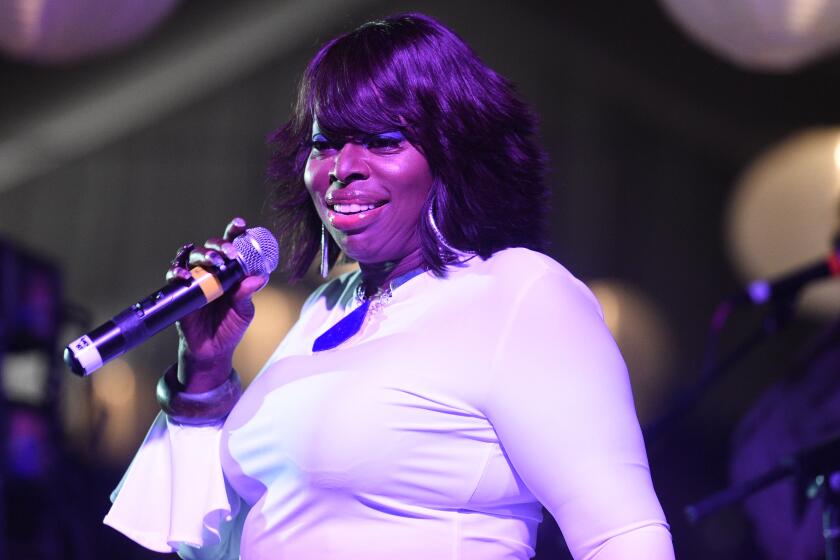The Rosenbergs Find a Partner in Robert Fripp
- Share via
The band that became a cause celebre earlier this year by saying no to music-business titans Jimmy Iovine and Doug Morris is hoping to become a trailblazer via a contract offer it’s saying yes to.
The Rosenbergs, a Long Island pop-rock band, turned down a chance to appear on the USA Network’s “Doug and Jimmy’s FarmClub.com,” which features an unsigned band alongside established stars. With its interface of Internet, TV and a record label, FarmClub is touted as a new model for the music business.
But the Rosenbergs refused to sign the contract for the appearance, balking at a clause giving FarmClub a monthlong option on signing the band. The resulting attention actually led to the FarmClub’s dropping the option requirement for future unsigned band appearances--and won the troublemakers a fan in English musician Robert Fripp, a longtime battler of music business conventions.
Fripp is now working a deal with the band that some are saying could itself be a new model for the business. The key elements of the deal are that Fripp’s Discipline Global Mobile label, with distribution from RykoPalm, will grant the Rosenbergs full ownership of their master recordings, something almost unheard of in the major-label world. In return, the band cuts the label in on revenue not just from record sales, but also from concert tickets, merchandise and Internet sources.
“The only way we could make it work is a total partnership,” says David Singleton, label manager of London-based Discipline.
Conventional deals, Singleton notes, leave labels with income only from record sales--a source that many feel is in danger with the growth of free music downloading. Many labels fear that process will cut into record sales, while some artists maintain that they still benefit from fans’ hearing their music, resulting in more concert ticket sales and other benefits.
In the Rosenbergs’ new deal, all parties have a stake in anything that increases awareness of the band, regardless of its impact on record sales. And with that in mind, a promotion is being negotiated with the controversial song-swapping site Napster.
“The way things are now, the music becomes more of a promotional tool for building a brand name,” says Singleton. “And in an old-world contract, you’re not going to be able to move in the same way.”
The relationship, says Rosenbergs manager Adrian Malloy, is more like that of a venture capitalist funding a start-up business than a record company signing a band.
“Some labels are realizing that they need to think ‘out of the box’ and get away from what has become their only function--selling the plastic disc,” he says.
Rosenbergs singer-guitarist David Fagin says that the group also turned down offers from Epic and BMG, having seen too many friends tangled in legal battles with labels and left without either label support or ownership of their recordings. Even if this deal doesn’t pay off, he says, it’s better than that alternative.
“It can’t be any worse than the majors, because if it falls apart and we crap out in a few months, we still own the record and are free to license it elsewhere,” he says. “If we crap out on a major, all our work goes down the toilet and we end up in court for five years.”
LILITH, LOUDER: By packing it in after three successful years, Lilith Fair seems to have left a void for female-oriented music tours. But a new female tour is being tested with an eye toward stepping up to Lilith’s level next year.
And this one’s going to be noisier, at least in part. Called Women Who Rock, the venture will debut Sept. 23 at the Palace with a show headlined by Orange County ska-rock band Save Ferris, punk veterans the Muffs and industrial-tinged Snake River Conspiracy, with several other West Coast dates to follow.
Organizer Chris Baca, who manages Save Ferris as well as Cleaner, a new band that’s also on the bill, says that he has opened discussions with such acts as the Pretenders, Joan Jett and Kittie about the bigger tour, which he hopes to launch in the spring. Ideally, he says, it will cover a fuller breadth of styles than Lilith, which came under some fire for a lack of harder-edged rock artists.
“Music isn’t gender- or genre-specific,” Baca says. “Women are great at folk, great at pop, great at punk, great at metal. Why not go out and show that?”
MANN UPDATE: The Aimee Mann anthology on the schedule of Universal Music’s Hip-O reissues label--the one that Mann manager Michael Hausman recently pledged to stop--is apparently still in the company’s plans. It’s even being promoted by Hip-O, with an ad in the new edition of music monthly ICE.
Hausman maintains that Mann, who won release from Universal’s Interscope label in a much-publicized battle last year, retains approval rights for any reissue or anthology and that if the album is released it may be met with a lawsuit.
More to Read
The biggest entertainment stories
Get our big stories about Hollywood, film, television, music, arts, culture and more right in your inbox as soon as they publish.
You may occasionally receive promotional content from the Los Angeles Times.










